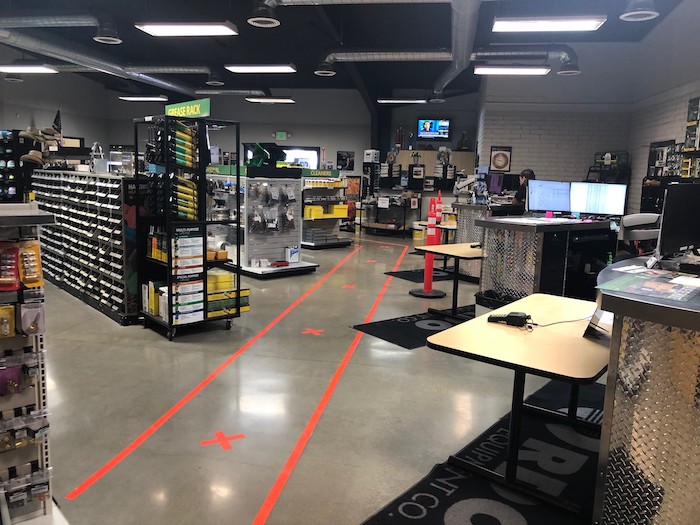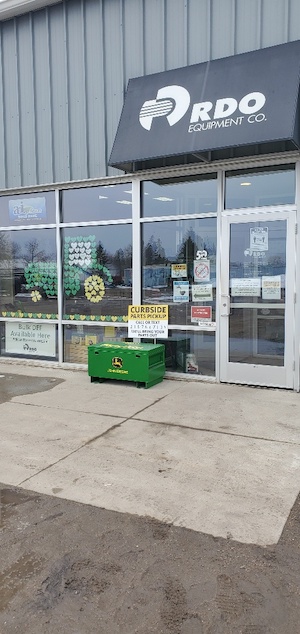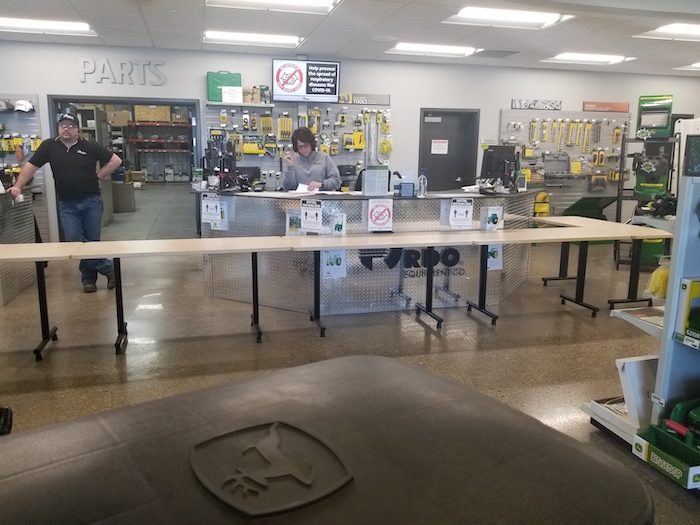Workplace safety has gotten a makeover. Within the past 3 months, it seems as though every company, whether a local restaurant or a large retailer, is letting you know safety is its number one priority.
While safety has always been the number one priority for equipment dealerships, it has taken on a lot of new characteristics throughout these past few months. Safety is now a much more encompassing idea and successfully implementing safety measures has never been more urgent.
Traditional to Today’s Safety
Most dealerships support a culture of following basic best practices; things like team members proactively pointing out trip-and-fall hazards in the shop, documenting accidents for future prevention, even offering technology like wearable devices for field service technicians.
That’s not to say those foundational practices aren’t still crucial — they are. RDO Equipment Co. practices several of these policies as part of the foundation of its safety culture (for more on the basics of safety, read RDO’s safety tips article in Rural Lifestyle Dealer). It’s just that now, the scope of safety has expanded, both in terms of additional practices and a mindset around it.
Here are five ways RDO has revitalized its commitment to safety through the pandemic and into this new normal of life we’re all leading. Our team consulted with manufacturers and other retailers, as well as followed public health guidelines to make sure we’re staying up to date. There are more than 75 RDO stores across the country that vary in size and inventory. We’ve found that, with slight modifications, these practices are applicable to dealers of all sizes.
1. Cleaning and Covering
Hygiene, both for the store itself and individuals at work, is perhaps the largest mindset shift the COVID-19 pandemic has brought. Of course, it was always important for employees to wash their hands and to wipe down showroom shelving, parts counters and individual work areas every day. However, those practices, once thought of as basic hygiene are now among the most crucial safety measures of any retail business, equipment dealerships included.
Stopping the spread of germs is now perhaps the single-biggest safety priority of dealerships, to protect both team members and customers. In addition to frequent handwashing, availability of hand sanitizer, and multiple daily cleanings of frequently-touched surfaces and equipment, RDO’s enhanced cleaning policies state how to clean effectively and what types of products to use — as well as what not to use.
Another new practice — and one that certainly has been among the most hotly-debated CDC recommendations — is encouraging masks for all team members and customers. While not required in all RDO stores, masks are being provided so that each location can best follow its county or state’s guidelines as related to mask usage in efforts to slow the spread of germs.
2. Applying Social Distancing
A term that was likely used rarely, if ever, before COVID-19 has now become synonymous with our daily lives: social distancing.
Most states are advising or requiring individuals to practice safe social distancing of 6 feet, whether that means taking food to-go rather than dining in at a restaurant or moving off the sidewalk to give others room when taking a walk or going for a run. Dealerships can apply social distancing in stores in a few different ways.

RDO general managers across the footprint have installed simple 6-foot boundaries between parts counters and customers. These reminders to social distance have taken the shape of barrier cones, tables and tape.
At RDO stores, public access is limited, entering and exiting through designated doors only. Similarly, team members are only to use the dedicated single points each of entry and exit.
Offices, parts storage areas, breakrooms — areas once thought of as gathering spaces — now have limits on the number of people allowed in them at a time. Breaks, for example, are staggered to prevent more than 5 people in the breakroom at any one time.
Finally, a daily practice in most RDO stores is gathering team members for a quick huddle. These daily store huddles and other large group gatherings are now being done as virtual meetings, using tools like Microsoft Teams or via increased email and phone communication.
3. Browsing, Buying &Talking Business
Perhaps nothing in the dealership day-to-day has been impacted more by COVID-19 than the equipment buying and selling process. Social distancing means most showrooms are roped off to some degree, while some have been closed altogether. Even as those that closed begin to reopen, the once-normal practice of customers stopping by to browse, buy or just talk about the business looks different now.
Dealers can use — and are using — this as an opportunity to get creative, finding ways to keep those face-to-face relationships with customers, and make their shopping experience positive, without actually being there in person. Keep in mind that not all customers are used to browsing and buying online, so a variety of options to accommodate the less-savvy are a must.
At RDO, easy-to-use virtual meeting tools like Microsoft Teams have worked well to schedule video check-in and catch-up calls with customers, ensure our teams are still in tune with our customers’ challenges, opportunities and needs. The stores are also offering equipment walkaround videos to give potential buyers a sense of being up-close with the machine of interest, and making it an even more personal experience by connecting via Facetime or Google Duo for one-on-one machine walkarounds.
On a recent episode of RDO’s used construction equipment video series, The Track, host Dennis Howard spoke to a customer about the experience using Teams meetings. The customer, United Equipment Company, was one of RDO’s first to try this approach and have been pleased with it.
“I don’t think it replaces human, face-to-face interaction but it’s definitely second best,” Dustin Logsdon, Vice President of United Equipment Company said. “What I like is you can have any number of people on at any given time so, depending on what type of meeting you want, you can facilitate what you need.”
4. Contact-Free Parts Fulfillment
One of the most common interactions between dealership employees and customers happens at the parts counter. While RDO stores have put into place buffer zones of 6 feet or greater, they are also reminding customers of new and existing ways to order that don’t involve getting too close.
For most dealers, online, email and phone parts ordering has always been offered but customers had to come in to pick up orders or have them shipped. RDO customers now have the option to pick up orders curbside or have parts delivered in certain areas, contact-free.
5. Service at a Safe Social Distance
Equipment service remains crucial, as crops continue to be planted, harvested and cared for no matter what’s going on in the economy. In conversations throughout the last few months, it’s clear other dealers are implementing changes to their service programs. Here’s how RDO is making service as safe and contact-free as possible.
 When thinking about equipment service, it’s tough to imagine how it can be done while practicing safe social distancing. How does a machine get service without a service manager or technician interacting with the customer, in person, in some way? A machine throwing a code may just need a simple software update — but how does that happen without one of your team members stopping by a customers’ shop or field with the flash drive that has the update?
When thinking about equipment service, it’s tough to imagine how it can be done while practicing safe social distancing. How does a machine get service without a service manager or technician interacting with the customer, in person, in some way? A machine throwing a code may just need a simple software update — but how does that happen without one of your team members stopping by a customers’ shop or field with the flash drive that has the update?
While service requests, whether they’re done in the shop or the field, still must come with some level of interaction, the ability to schedule service over the phone or online vs. in-person is an option to remove one point of contact.
For service requests on machines down in the field, RDO implemented a few steps to protect field service technicians. First, all customers answer a brief questionnaire over the phone to help gauge the risk of exposure to the technician. Another practice that many other dealerships are doing now, too is equipping field service technicians with cleaning protocols to ensure they properly disinfect the machine and cab upon entry and exit.
On the truly virtual side, most dealers are equipped to offer phone and email support for technology, as well as machine troubleshooting and basic repairs. Consider exploring additional opportunities, either on your own or in partnership with manufactures, to elevate the level of remote service, even send software updates directly to the machine. Again, tools like Microsoft Teams and video calls can further enhance the service experience by offering a safe face-to-face opportunity.
As with most options discussed so far, this level of remote support, machine monitoring and virtual repairs have been offered by many dealers for quite some time, however, they’ve now become more important than ever and will continue to be options customers need and want.
Looking Forward
The COVID-19 pandemic has caused major change when looking at the full scope of safety and what safety really means for dealers. While safety has had its makeover, in our business we still know the value of having a friendly face — or voice — to help solve customer problems. Making a few adjustments helps our businesses keep moving forward together, even now.





Post a comment
Report Abusive Comment